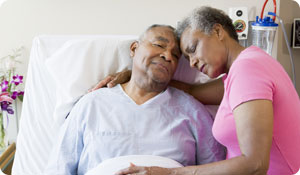
The goal of cancer treatment is to put the disease in remission. Patients are in remission when all the signs and symptoms of their cancer disappear. For many patients, remission is permanent.
When cancer recurs (returns), it is the same type of cancer. After treatment ended, a small number of cancer cells survived and remained in the body. Sometimes these cells remain dormant for a while.
- When cancer recurs in the same place and has not spread it's a local recurrence and it's usually curable.
- Sometimes it has moved into the lymph nodes or nearby tissues; this is a regional recurrence.
- Distant recurrence means the cancer has spread (metastasized) to other parts of the body.
It's very rare for cancer survivors to develop a new, unrelated cancer.
Incidence of Recurrence
If you're a cancer survivor, you probably live with some anxiety about your cancer returning. The National Cancer Institute's (NCI) most recent study on the incidence of recurrence reviewed the records of two million cancer patients between 1973 and 2000 who survived at least two months after diagnosis. The study predicts the likelihood of cancer returning by site of tumor, age, and race.
Here are a few highlights from this review:
- Cancer survivors have a 14 percent risk of developing a new malignancy within 25 years following diagnosis.
- The risk of recurrence is highest in the first five years after diagnosis and tends to decline somewhat over time.
- Survivors of childhood cancers are about six times more likely to experience a recurrence. Experts believe that initial therapy and genetic susceptibility are major risk factors for subsequent cancers. There's an inverse relationship between age at initial diagnosis and likelihood of recurrence.
- Overall, females have a slightly higher relative risk for recurrence than males. However, males are at greater risk when their initial cancer occurs before age 60.
Preventing Recurrence
The same factors that help protect against cancer in the first place can also reduce your risk of developing cancer again. Eat a well-balanced diet with plenty of fresh fruits and vegetables, maintain a healthy weight, don't smoke, and limit your alcohol consumption.
Coping With Recurrence
The Mayo Clinic offers a few tips for coping with the emotional rollercoaster a cancer recurrence can trigger.
- Remember, you know more now than you did the first time, which may help reduce your anxiety a bit.
- You've already built a relationship with a trusted oncology medical team.
- Since you've done this before, you know what's best for you.
Sources:
National Cancer Institute. "When Cancer Returns." Web. 23 August 2005.
http://www.cancer.gov/cancertopics/coping/when-cancer-returns
MacReady, Norra. "Cancer Survivorship: An Expert Interview with Nancy Jo Bush, RN, MN, MA, AOCN." Medscape Medical News. 28 May 2010. http://www.medscape.com/viewarticle/722660
Curtis, R.E., Freedman, D.M., Ron, E., Ries, L.A.G., Hacker, D.G., Edwards, B.K., Tucker, M.A., and Fraumeni, J.F. Jr. "New Malignancies Among Cancer Survivors: SEER Cancer Registries, 1973-2000." National Cancer Institute. http://seer.cancer.gov/publications/mpmono/





